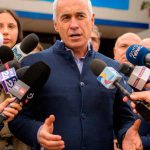Roman Chumak
- Oleksandra “Sasha” Kuvshynova died in Ukraine on March 14 at the age of 24.
- She and her Fox News colleagues were attacked while reporting in the suburbs of Kyiv, a combat zone.
- Kuvshynova’s father told Insider he did not understand why they took on such a dangerous trip.
The Ukrainian news producer Oleksandra Kuvshynova — Sasha to all who knew her — always surprised her parents with her quiet independence.
In February 2014, she disappeared from home in Kyiv as it was gripped by the Euromaidan revolution which ousted the government and changed Ukraine forever. It almost got her killed, her father, Andrey Kuvshinov told Insider.
“Twenty-four hours later, we found out that our daughter — who was still a schoolgirl at the time — was at the media center, helping with her friend to translate texts,” he told Insider.
The building, the Trade Union Hall in central Kyiv, burned to the ground a few hours after she got home, and 22 people died.
Eight years later, Russia invaded Ukraine and Sasha again found herself helping tell the world, this time as a field producer working with Fox News.
On March 14, 2022, Sasha drove out of Kyiv on an assignment with two Fox veterans: reporter Benjamin Hall and cameraman Pierre Zarkrzewski. She’d been contracted with Fox for around two months.
Their destination was Irpin, a town northwest of Kyiv that had come under attack in recent days, according to a Telegram post by Anton Gerashchenko, an adviser in the Ukrainian Ministry of Internal Affairs.
Fox News
According to Fox, they were not accompanied by security personnel the whole way, but dropped off at an earlier stage. A spokesperson said the security team knew their location at all times.
Near Horenka — a village that had been under heavy attack by Russia — an explosion hit their car. It killed everyone but Hall, who was badly hurt, losing one leg, his other foot and sight in one eye. Little more is publicly known.
In the weeks since she died, Insider spoke with Sasha’s father, several of her friends, Fox News, and journalists in Kyiv doing similar work to find out more about what happened that day, the risks local producers face, and what kind of person Sasha was.
Sviatoslav Yurash, a Ukrainian MP told Insider that the Fox News trip was likely an “embed,” where the military takes journalists with them to cover events.
Fox News declined to provide further details of the trip, citing the security of its staff still in Ukraine. Military officials and authorities in Kyiv also declined to comment.
“Utterly destroyed”
Yurash, who was a friend and former boyfriend of Sasha, told Insider he had seen video of the aftermath of the attack, taken by soldiers who found and rescued Hall.
He said they were struck around the Kyiv city limit, where it meets the wider Kyiv administrative region.
“The car is utterly destroyed,” said Yurash, describing the video. “You can see that this was either a direct hit, or something of this sort.”
Gerashchenko, the Ukrainian official, said in his post the car had been hit by a mortar shell or artillery fire from Russian forces.
It is unclear if the car was a military vehicle, a civilian one, or if it was marked as being used by journalists. Andrey Kuvshinov, Sasha’s father, told Insider that Sasha always wore her “press” clothing.
By international law, journalists are not legitimate military targets. Intentional killing of civilians — a category that includes journalists — is a war crime.
The attack prompted questions about why the Fox team took their reporting trip.
Andrey Kuvshinov told Insider: “I don’t understand how a decision was taken for Fox News to go where it was dangerous, where there was a live threat.”
“It was so scary round there. Why did they end up there?
“They were not ready for evacuation, they didn’t know what to do. They took ages to find each other. So how could the managers be so irresponsible and send people who were not prepared at all to the military zone?”
For Andrey, the news is still difficult to take in. “All I know is hearsay,” he said. “So I’m still hoping she’s alive.”
A Fox News spokesperson declined to respond directly to Kuvshinov’s questions, or describe the story that the team was pursuing.
Alfred Hackensberger, a reporter for Die Welt who was also based in Kyiv at the time, told Insider the decision to go in the direction of Horenka was unwise. (Die Welt shares a parent company, Axel Springer, with Insider.)
“From my point of view, there was no journalistic reason to go there, because everything is already documented,” he said.
Visits to Horenka were possible even the day before, when The New York Times reported from the area. But even before then journalists were being killed and injured all over Ukraine.
The dangers of exposing Putin’s war
Dominique van Heerden is a Sky News producer who narrowly escaped an ambush near Kyiv with her colleagues. She told Insider that a previously safe area can become dangerous in moments.
She noted that she and colleagues were attacked after turning back from their destination, down a road they took earlier that day without incident. She emphasized she had no specific knowledge of the attack that killed Sasha, and wasn’t in a position to judge any decisions taken.
Risk-taking is often celebrated up to the point that somebody is hurt, she noted.
“Sometimes, when you push a story a bit too far and you get a great story, you’re ‘brave,’ and you’re ‘amazing,’ and you’re shining lights.
“And when you maybe push a bit far, and you don’t get a story, and something goes wrong, then you are stupid. So it’s a no-win situation.”
The attack also reignited a discussion of how Western outlets work with local reporters, Margo Gontar, a journalist and a friend of Sasha’s, told Insider.
Sasha’s role is generally referred to in the industry as a “fixer,” people who can provide local knowledge, translation, practical help, and arrange access that would otherwise be unavailable to foreign reporters abruptly arriving in a war zone.
Fixers for Western media rarely get equal credit, as The Washington Post reported, despite facing equal danger.
That hierarchy appeared to play out when Sasha died, as Fox first announced the critical injuries to Hall, then the death of Zakrzewski, and only hours later that Sasha was also killed.
Several journalists accused Fox of appearing to give Sasha secondary importance to its US-based employees.
But Trey Yingst, a Fox News correspondent also in Ukraine, said the network had held back out of respect for her family.
—Trey Yingst (@TreyYingst) March 16, 2022
Yurash, the Ukrainian MP, confirmed this to Insider. “The family was in a state of disbelief about what happened,” he said. “As soon as there was acceptance from the parents, there was a statement about Oleksandra.”
Van Heerden said that fixers are often “really established and kind of amazing journalists in their own right.”
But where they differ from the international reporters is that they are doing all this while their own country — their own lives — are being turned upside down, she said.
International reporters usually get to go home. But for someone like Sasha, “this is not a story that they can leave,” she said. “This is their home.”
A tireless creative force
To those who knew her, the attack robbed the world of a talented and determined woman who dreamed of more than reporting the destruction of her homeland.
She loved poetry, cinema, photography, and electronic music — which she shared by organizing the KRAI festival in Kyiv, and jam sessions in the city.
Like other creatives, she gravitated naturally towards the hipster neighborhood of Podil, where Gontar recalled sharing drinks and jokes with her.
One of her best friends, filmmaker Edwin Novak, said she was destined to push boundaries in documentary filmmaking. The opportunity to work with Fox was a big break towards that, he told Insider.
“She wasn’t just someone who just did a few projects and was kind of artsy and creative and all the rest, but she had a real ability to look further,” he said.
Roman Chumak
Fox News senior field producer Yonat Frilin, who worked with Sasha during the invasion, said in a tribute published by the network that her journalistic instincts were indispensable to the network’s reporting on the war.
She was funny and creative, with “a dark sense of humor,” Frilin said.
Novak told Insider that beneath that humor was the sort of wisdom of someone who’d lived several lifetimes.
He said: “She felt the pain of this world. She had an extraordinary capacity to understand it.”
Yurash, the MP who was Sasha’s friend and on-off boyfriend, mourned her as “the beauty of Kyiv.”
—Sviatoslav Yurash (@SviatoslavUA) March 16, 2022
Although she never really sought to be a leader, people often made her one, said her father Andrey.
When the war broke out, Sasha also started a volunteer initiative, UA.Life.Delivery, which brings munitions to the army and medical supplies and food to vulnerable people. The work helped “dozens of people,” said Kristina Parashchyevina, an architect who continues to co-organize the project, in a statement to Insider.
Sasha’s work ethic could be so fierce “she did not allow herself to rest for two to three days in a row sometimes,” said Novak.
The whole of Ukraine became a front line
A day or so before the war broke out, Sasha was drinking wine with Aleksey Horbach, a media producer. She planned to go to Donetsk, correctly anticipating that Russia would attack there first.
“But it turned out the whole of Ukraine became a front line,” Horbach wrote. “So she stayed in Kyiv to highlight the war.”
Friends tried to persuade her not to do such perilous work. But several told Insider that she understood the risks. “I asked her if she really wants to work as a war journalist, because it is very dangerous,” Horbach said.
Roman Chumak
“She replied with: ‘Sure, because I am doing what I truly like,'” he said. “For this she gave her life.”
Novak, the close friend, forwarded Insider a WhatsApp video Sasha sent to some friends in the days before she was killed, discussing the risks she was taking.
“The first time I was in those places, I was scared,” said Sasha, describing trips to areas near Kyiv under attack.
“And today I went, just like that, looking around. They are shooting everywhere, something is on fire, something is flying, and I’m like: Okay.
“Maybe it’s the nice weather, I don’t know. But I’m already used to it, I no longer have fear […] I stare at it with cold eyes. It will be as it will be.
“If it falls, it falls — sure, it will be unpleasant, it will suck, I might die. But … it’s like that.”
Powered by WPeMatico






